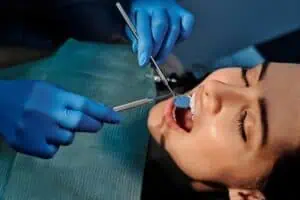
- Brush and Floss Daily
It’s no secret that brushing and flossing daily is crucial for good oral hygiene. Brush your teeth twice a day with fluoride toothpaste and floss at least once a day to remove any food particles and plaque buildup. Don’t forget to also brush your tongue to remove any bacteria and keep your breath fresh.
- Eat a Balanced Diet
What you eat can have a significant impact on your oral health. A balanced diet with plenty of fruits and vegetables, lean protein, and whole grains can provide the necessary vitamins and minerals for healthy teeth and gums. Avoid sugary and acidic foods and drinks, which can cause tooth decay and erosion.
- Schedule Regular Dental Checkups
Regular dental checkups with your dentist in Asheboro are essential for maintaining good oral health. During your checkup, your dentist will examine your teeth and gums for any signs of decay, gum disease, or other oral health issues. Early detection and treatment can prevent more significant problems down the road. Schedule your next dental checkup today in order to stay on top of your oral health.
- Practice Good Habits
In addition to brushing and flossing, there are other good habits you can practice to maintain a healthy smile. Avoid smoking or using tobacco products, which can cause oral cancer and gum disease. Limit your alcohol consumption, as alcohol can dry out your mouth and lead to bad breath and tooth decay. Drink plenty of water to keep your mouth hydrated and wash away any bacteria.
- Consider Cosmetic Dentistry
If you’re looking to improve the appearance of your smile, consider cosmetic dentistry options. Teeth whitening can brighten your smile, while veneers can cover chips or cracks in your teeth. Talk to your dentist in Asheboro about all the cosmetic dentistry options available to you.
This National Smile Month, and all year around, take great care of your oral health so that you can smile proudly.















